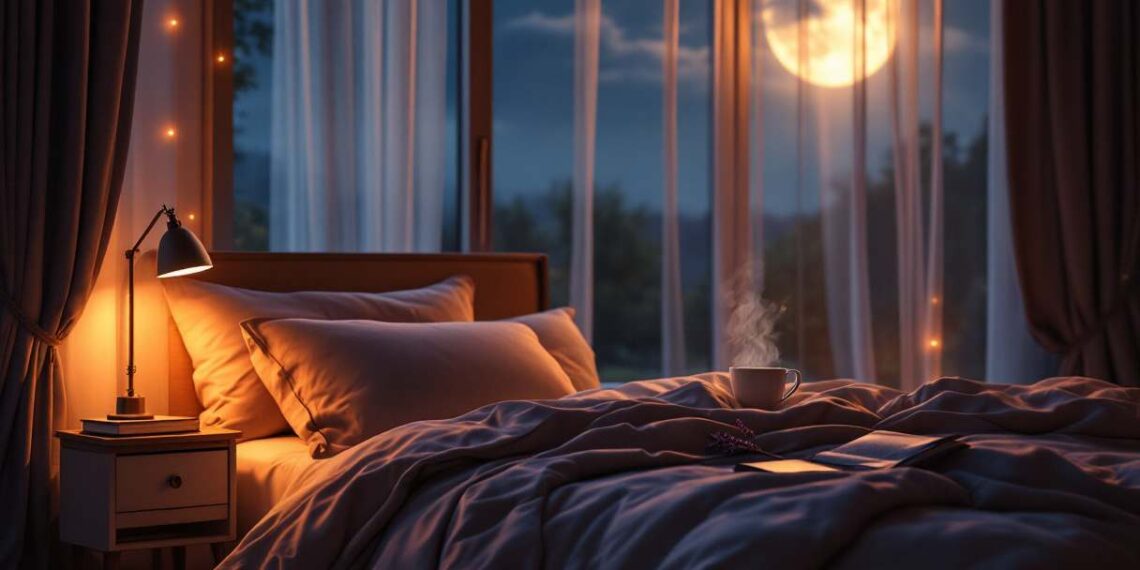Can’t remember the last time you had a truly restful night’s sleep? You’re not alone. In our always-on world, the art of peaceful slumber has become as elusive as a unicorn. But what if turning your chaotic nights into blissful rest was simpler than you thought? Welcome to your guide to crafting the perfect sleep sanctuary – where science meets serenity, and counting sheep becomes optional.
Whether you’re a stressed executive, a busy parent, or just someone who’s forgotten what “well-rested” feels like, it’s time to transform your evenings from frazzled to tranquil, one habit at a time.
Setting the Stage for a Peaceful Night
Getting your snooze on starts with setting a chill vibe. The right evening habits can make all the difference when it comes to catching those quality Z’s. Let’s keep it real and helpful without sounding like a public service announcement.
“Sleep is the golden chain that ties health and our bodies together.”
Importance of Evening Habits for Sleep
What do you do before bed?—Totally matters. Think of it like a warm-up for sleep. It’s like telling your brain, “Hey, time to chill out and drift off.” Doing things that calm you down can make it easier to fall asleep and actually stay asleep like a baby wearing earplugs.
| Evening Habit | Why It’s Cool |
|---|---|
| Bedtime on Repeat | Keeps your body clock tick-tocking just right |
| Chill-Out Activities | Helps ease your mind and body into sleep mode, great for anxiety chills |
| Ditching Late-Night Coffee | Reduces sleepless tossing and turning efforts |
Wanna upgrade your bedtime routine? Check out some killer bedtime rituals that could be game-changers!
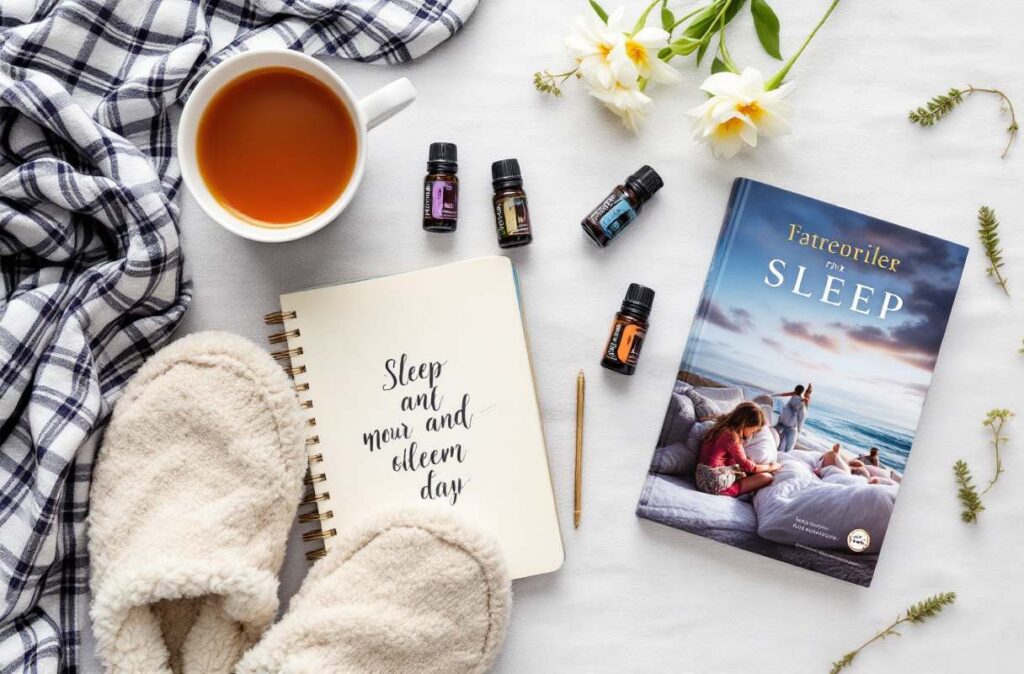
Understanding Sleep Hygiene
It’s not just about brushing your teeth; sleep hygiene is all about the tips and tricks that keep your sleep refreshing and uninterrupted. Vital for anyone tossing and turning at night! Here’s how you can make your bed a haven for sweet dreams:
- Stick to a sleep schedule like glue.
- Make your space as cozy as a Sunday morning.
- Turn off those digital glow sticks before hitting the sack.
By adopting these no-brainer habits, you can sleep better and maybe even kiss those sleep problems goodbye. If you need more direction on setting up a routine that rocks, check out tips on sticking to a sleep routine.
| Sleep Hygiene Move | What It Does |
|---|---|
| Wake-Sleep Same Time | Keeps your sleep cycle steady and reliable |
| Cozy Up Your Zone | Control temp, light, and sound for maximum comfort |
| Screen Break Before Bed | Cuts down on pesky over-stimulation from devices |
Following these sleep improvement tips can be the ticket to getting the rest you need. For more juicy details on tweaking your bedtime setup, our article on sleep hygiene has got you covered.
Creating a Soothing Evening Routine
When the day’s hustle slows to a stop, setting up a relaxing evening routine can really level up sleep quality. These evening habits set the stage for rocking some good shut-eye.
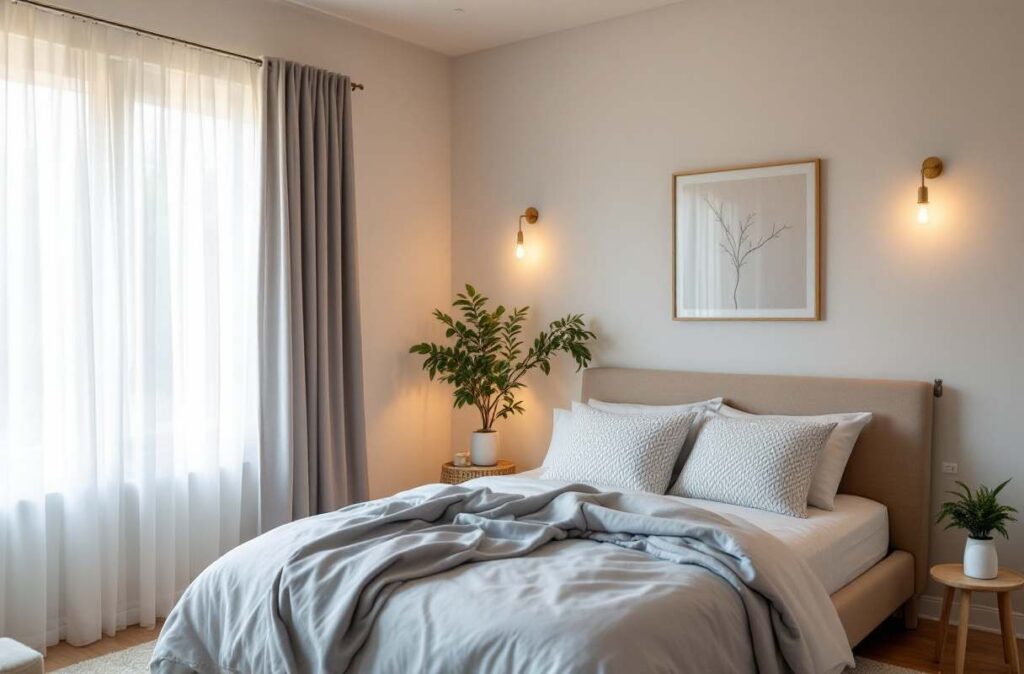
Getting Bedtimes Down to a Science
Going to bed at the same time each night isn’t just for kids; it’s crucial for anyone looking to score some quality Zs. A steady bedtime routine gets your body’s inner timekeeper, the circadian rhythm, ticking like clockwork. Keep this rhythm steady, and you’re in for a smoother night’s sleep and an easier morning rise.
Check out this table laying out the goodness of sticking to a bedtime:
| Really Cool Perk | What It Does for You |
|---|---|
| Sleep That’s Not Lacking | Racks up more hours of sweet sleep |
| Sleep That Feels Great | Enjoys deeper, more refreshing slumber |
| Mornings That Don’t Suck | Wakes up naturally, sans alarms |
| No Sleep IOUs | Manages to avoid stacking up sleep debt |
Aligning with this routine means hitting the hay and waking up at the same time every day—yes, even on those lazy weekends. Having a journal to jot down your sleep pattern musings, like the sleep journaling option, can help keep things on track and open your eyes to adjustments needed.
Chill Out Before You Clock Out
Before you bid the day adieu, fill those moments with wind-down time that signals to your brain it’s time to hop on the snooze train. Try out:
- Getting lost in a book
- Soaking in a warm bath
- Stretching it out with mellow yoga
- Tuning into calming jams
Mindfulness bits like the 4-7-8 breathing technique can mellow out those racing thoughts. It turns out, that science says chill activities like these can squash anxiety and help you cruise into a calmer state.
A room that’s set aside for pure de-stress vibes can make a huge difference, helping to kick distractions to the curb. Want more tips? Dive into some bedtime rituals made specifically for what floats your boat.
With a routine bedtime and pre-sleep relaxing activities on lock, those evening habits will soon morph into rockstar sleep sessions.
Environment Matters
Nailing the perfect vibe in your bedroom can make all the difference when it comes to catching those Z’s. The way your bedroom is set up and how snug your bedding feels can mess with—or massively improve—your sleep quality.
Creating a Sleep-Conducive Bedroom
Think of your bedroom as a chill-out zone to make falling asleep easier. Here’s the skinny on what you should focus on so your bedroom helps you snooze:
| Element | Recommendations |
|---|---|
| Lighting | Set the mood with dim lights or blackout curtains to cut down light exposure. |
| Temperature | Keep it cool and cozy, somewhere between 60°F and 67°F (15°C – 20°C). |
| Noise Levels | Drown out the racket with white noise machines or hit the hay with earplugs. |
| Aromatherapy | Chill out with some soothing lavender scents from candles or essential oils. |
| Clutter | Neatness matters; a tidy room gives you that peace to relax. |
Focus on these small deets to turn your sleep space into a relaxing retreat. Want to dig deeper? Check out our article on sleep hygiene.
Importance of Comfortable Bedding
Good bedding’s like a first-class ticket to dreamland. Whether it’s the feel of your sheets or the fluff of your pillow, what you’re sleeping on counts big time. Here’s what to keep an eye on when shopping for bedding:
| Bedding Item | Considerations |
|---|---|
| Mattress Type | Go for a mattress that fits your style—whether it’s firm, squishy, or memory foam. |
| Pillow Support | Get pillows that let your neck and head relax just right. |
| Sheet Fabric | Choose light, airy fabrics like cotton or bamboo for breathability. |
| Blanket Weight | Decide if a lightweight or heavy blanket suits your personal snugness. |
Putting your money into comfy bedding can change your whole sleep game, making your nights restful and your days sunny. Pair this with some thoughtful bedtime rituals to round out your sleep setup. Paying attention to these things will back up your nightly routine and set you up for better sleep.
Technology and Sleep
Alright folks, let’s face it — our gadgets are everywhere, even sneaking in under our bedsheets! But if you want to catch some Z’s without those pesky interruptions, it’s time to get savvy about how tech affects our sleep groove.
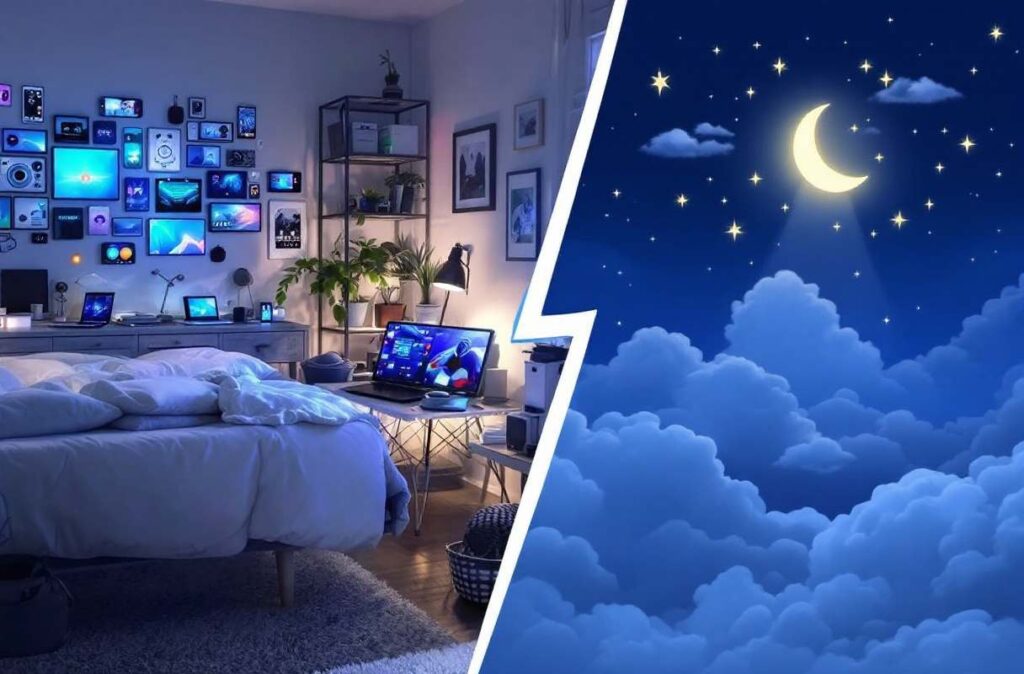
Managing Screen Time Before Bed
Late-night screen marathons? Bad news, pal. That shiny blue light from our fave devices is messing with our melatonin—the stuff that helps lull you to dreamland. To snooze like a pro, experts suggest hitting pause on-screen use just before you hit the hay. Check out these screen time tips by age:
| Age Group | Recommended Screen Time Before Bed |
|---|---|
| Kids (under 12) | 30 minutes |
| Teens (13-19) | 1 hour |
| Grown-ups | 1 hour |
Why not rope the family into some good, old-fashioned unplugged fun? Think reading a juicy novel or doodling. Parents looking to tuck their kiddos in like a whisper should look into those special bedtime rituals that tone down screen exposure.
Utilizing Tech for Better Sleep
Tech: it might be a party pooper for sleep, BUT—here’s the twist—it can also be your nighttime sidekick. A slew of apps and gadgets are out there to spruce up your snooze. Let’s break it down:
| Tech Type | Functionality |
|---|---|
| Sleep Trackers | Keeps tabs on your sleep rhythm so you can craft the perfect consistent sleep schedules |
| Meditation Apps | Offers chill-out guides and mindfulness |
| White Noise Machines | They hum you lullabies that drown out the chaos |
Ditch the screens a couple of hours before hitting the sack, and watch your sleep game level up. For those yearning to cut down on screen time, consider diving into the magic of a digital detox for sleep.
Making tech your sleep-friendly buddy can take you closer to dreamland bliss. By setting some nighttime rules and sticking to them, you’re on your way to enjoy peaceful slumbers and waking up ready to conquer another day.
Nutrition and Hydration
Eating right and staying hydrated ain’t just about feeling good; it’s about sleeping well too. Mixing up your evening habits with smart food choices and drinking patterns can work wonders for a good night’s rest.
Evening Snacks for Better Sleep
Picking the right bites before bed can make snoozing easier. Some munchies have magic stuff that chills you out and gets the Z’s rolling. Adding these to your nighttime routine can make slipping into the dream world a breeze.
| Snack Options | Stuff Inside | Why It’s Cool |
|---|---|---|
| Almonds | Magnesium | Relaxes your muscles |
| Yogurt | Calcium & Tryptophan | Makes you sleepy and aids digestion |
| Kiwifruit | Vitamin C & Antioxidants | Helps you fall asleep faster |
| Oatmeal | Complex Carbs | Boosts serotonin for better sleep vibes |
| Bananas | Potassium & Magnesium | Eases muscles and nerves |
These munchies help set a chill stage for sleeping tight. For more planning tips, peep our pre-sleep routine which can get you munching right before bed.
Hydration Habits for Restful Nights
Hydration’s not just a daytime thing; it impacts your sleep too. Getting enough H2O all day keeps things running smoothly, but hit the brakes a bit before bed to avoid late-night sprints to the loo.
| Hydration Tips | What to Do |
|---|---|
| Drink Water | Shoot for 8-10 cups daily |
| Tweak It Based on Sweat | Drink more if you’re hitting the gym in the evening |
| Keep It Light Before Bed | Slow down the sips 1-2 hours pre-sleep |
| Herbal Teas | Go for chamomile or other decaf brews before turning in |
Tracking your evening sip-o-meter helps in catching undisturbed Z’s. Be sure to avoid buzzing drinks like coffee as the day winds down.
Trying these nighttime habits might just help those tossing and turning find the sweet spot in sleep town. Check out more about getting your night groove on in our article on healthy sleep habits.
Physical and Mental Relaxation
Switching gears from the chaos of the day to a peaceful bedtime is the secret sauce for getting some quality shut-eye. Here, we’ll chat about some chill-out techniques and mindfulness hacks that’ll help folks get cozy before dozing off.
Relaxation Techniques Before Bed
Mixing in a bit of relaxation magic into your nightly routine can give your sleep a good boost. Check out these fan favorites:
| Technique | Description |
|---|---|
| Deep Breathing | Imagine slowing down with those deep, calming breaths. Give the 4-7-8 breathing techniquea whirl—it’s like a ticket to dreamland. |
| Progressive Muscle Relaxation | This one’s all about flexing and then melting the tension away from each muscle, turning stress into zzz’s. |
| Gentle Stretching | Easy stretches can help iron out those knots. A few calming moves right before bed and you’re golden. |
| Warm Baths | A nice soak eases you into relaxation mode. When your body cools after a warm bath, it gets the hint—it’s sleep-o’clock. |
Mindfulness and Meditation Practices
Mindfulness and meditation are like lullabies for the brain. Here’s how you can zen out before bed:
| Practice | Benefits |
|---|---|
| Guided Meditation | Clear that buzzing mind with a guided meditation. Tons of meditation apps for sleep can lead the way. |
| Sleep Journaling | Spill your thoughts onto paper to free up mental space. Keeping a sleep journal can also reveal sneaky sleep disruptors. |
| Visual Imagery | Picture your happy place—whether it’s a sandy beach or a quiet forest—to drift away from worries. |
| Mindfulness Meditation | Staying in the now and watching your thoughts come and go without fuss can give anxiety the boot, making sleep smoother. |
Adding these chill tactics into your evening wind-down ritual could be your ticket to smooth sailing into sleep. For more ways to craft a tailor-made pre-sleep routine, dive into techniques that fit you like a glove.
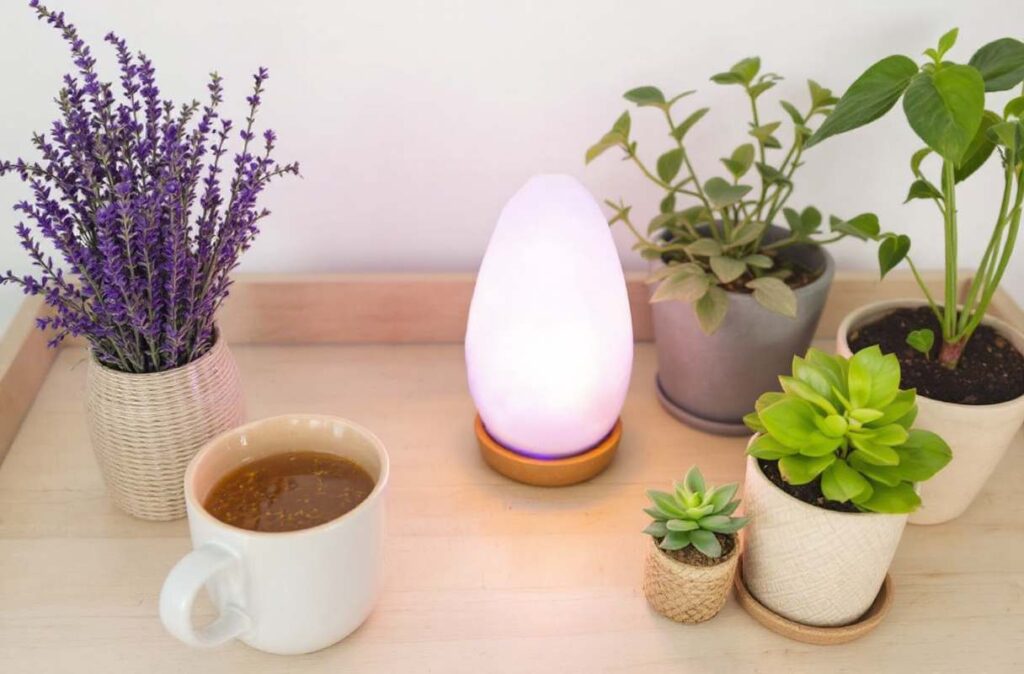
Establishing Healthy Sleep Habits for Different Groups
Getting a good night’s sleep can be as elusive as a cat in a room full of rocking chairs. Whether you’re dealing with cranky toddlers, pulling a night shift, or navigating the twilight years, everyone’s got their own bedtime battles. Let’s break it down.
Parents and Children
If you’re a parent, you’ve probably realized that coaxing your little ones into bed ain’t as easy as herding cats. The trick? Consistency. Kids thrive on routines as much as cats love knocking things off tables. Here’s a sweet little roadmap:
| Routine Element | Suggested Timeframe |
|---|---|
| Limit screen time | 1 hour before bed |
| Reading time | 30 minutes |
| Relaxation activities (e.g., gentle stretching, calming music) | 15-30 minutes |
| Bedtime | Same time each night |
Bring on some bedtime stories or coach them in the art of the 4-7-8 breathing technique — anything that doesn’t involve screen-induced hyperactivity. Parents will also benefit from having their own bedtime rituals, offering a double punch of relaxation and role modeling.
Shift Workers
Shift workers, your sleep schedule is probably more erratic than a teenager’s text messages, and that’s tough on your body clock. But fear not, here are some tricks to keep from turning into a zombie:
| Strategy | Description |
|---|---|
| Consistent sleep schedule | Aim for the same hours of sleep, regardless of when you punch the clock. Check out how to stick with a consistent sleep schedule. |
| Strategic napping | A catnap here or there can keep you from dragging your feet. Take a look at power nap benefits. |
| Light management | Think blackout curtains and bright lights like you’re a rockstar. Kickstart your circadian rhythm with some circadian rhythm reset techniques. |
And for keeping tabs on your bleary-eyed patterns, start some sleep journaling to figure out what works (and what doesn’t).
Seniors
As you age, you might find your sleep patterns changing faster than you can say “senior discount.” Trouble nodding off or waking up at the crack of dawn? Here’s the plan:
| Practice | Description |
|---|---|
| Regular sleep schedule | Same bedtime and dry-eyed wake-up each day builds a strong rhythm. |
| Physical activity | Keep moving, but leave the heavy workouts for the daytime. For more info on how exercising helps, look at exercise and sleep quality. |
| Relaxation techniques | Meditation or gentle yoga can turn off that whirring mind. Take a stroll down the possibilities with meditation apps for sleep. |
Seniors should also consider getting cozy with white noise machines for sleep to lull themselves into a blissful slumber.
In a world full of sleep-stealing gremlins (ahem, toddlers, shifts, and senior worries), you got to tailor your sleep game to keep those Zzzs flowing. Find the rhythm that suits your lifestyle, and your sleep will improve.
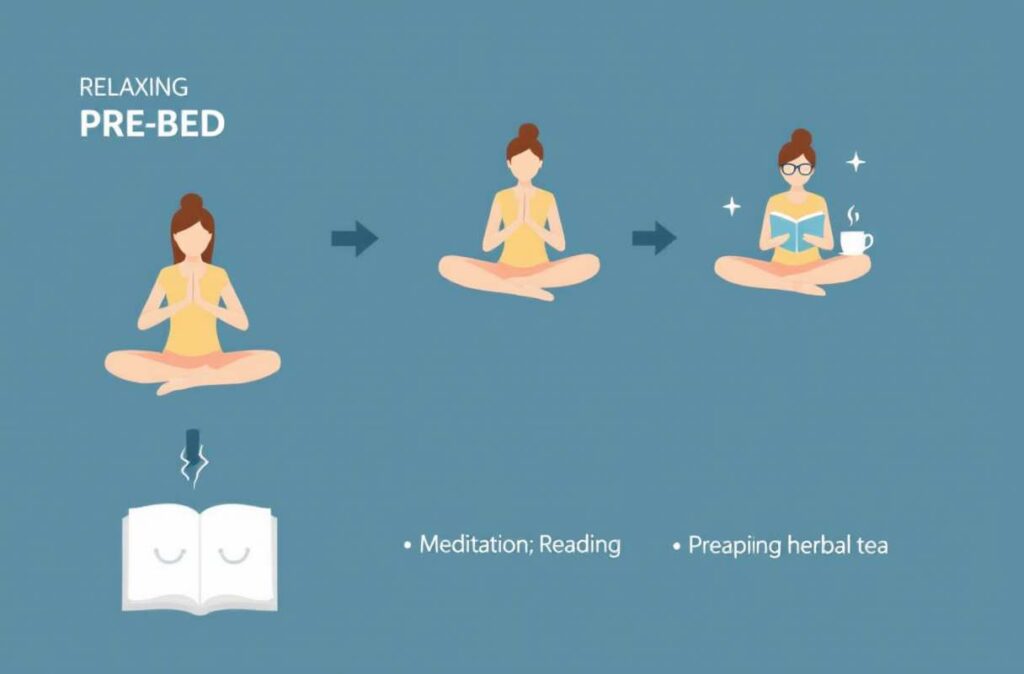
Troubleshooting Sleep Issues
Wrestling with sleep problems often stinks, but it’s crucial for feeling good and functioning well each day. Knowing when to ring up a pro and trying out simple fixes can make a real difference.
Seeking Professional Help When Needed
Sometimes, even after turning in early and cutting out the late-night TV, sleep still dodges you. That’s when it’s smart to chat with a health expert. They can dish out advice and treatments just for you. Here’s when you might want to consider dialing them up:
| Signs for Seeking Help | Description |
|---|---|
| Frequent Insomnia | Can’t drift off or stay snoozing at least three nights a week for over a month. |
| Persistent Fatigue | Always wiped, struggling to keep up during the day, even with enough Z’s. |
| Mood Swings | Big mood shifts, like amped-up anxiety or feeling blue, maybe tied to sleep woes. |
| Sleep Disorders | Suspected issues like sleep apnea or restless legs that crash the sleep party. |
Therapies like cognitive behavioral therapy for insomnia (CBT-I) can help, or your doctor might suggest a sleep study to dig into what’s up.
Tips for Overcoming Common Sleep Problems
Facing sleep snafus? There are tweaks you can make to bring back restful nights. Check out these handy tips sorted by your trouble spot:
| Sleep Problem | Tips |
|---|---|
| Insomnia | – Stick to a steady sleep schedule. – Keep a sleep journal to spot what’s messing with your sleep. |
| Restless Sleep | – Try chillout tricks like the 4-7-8 breathing technique. – Cut caffeine after lunch—coffee isn’t your nighttime buddy. |
| Difficulty Waking | – Ditch the weekend sleep marathon, it throws your body clock; see weekend sleep patterns. – Small power naps can renew energy without ruining nighttime sleep. |
| Stress and Anxiety | – Get your Zen on with mindfulness or meditation before bed; explore meditation apps for sleep. – Set up a relaxing pre-sleep routine to hit the chill button before bed. |
It might take a while to nail those bedtime habits, but hang in there! Everyone’s got their own quirks and sweet spots when it comes to lights out time.
Conclusion:
Creating your perfect sleep environment isn’t just about buying a comfy mattress or setting an alarm – it’s about orchestrating a symphony of habits that work in harmony with your body’s natural rhythms. From mastering the art of evening relaxation to understanding the impact of nutrition and technology on your sleep, you now have the tools to craft a personalized pathway to peaceful nights. Remember, great sleep isn’t a luxury – it’s a cornerstone of health and happiness. So tonight, as you begin implementing these changes, know that you’re not just setting the stage for better sleep; you’re opening the curtains to more energized, focused, and joyful days ahead.
FAQs:
What’s the ideal bedroom temperature for quality sleep?
Maintain 60-67°F (15-19°C), use breathable bedding, and adjust according to personal comfort level. Keep the room well-ventilated and consider using a fan or air conditioning to maintain consistent temperature.
How long before bed should I stop eating and drinking?
Stop major meals 2-3 hours before bed, though light snacks are acceptable if hungry. Limit liquid intake in the last hour to prevent nighttime bathroom trips. Choose sleep-promoting snacks like almonds or bananas if needed.
What’s the best evening routine duration?
A 30-60 minute wind-down routine is ideal, starting 1-2 hours before bedtime. Consistency matters more than length; focus on calming activities like reading, light stretching, or meditation. Adjust the duration based on your schedule while maintaining regular timing.
How can I quiet my racing mind at night?
Practice the 4-7-8 breathing technique, use sleep journaling to download thoughts, try guided meditation apps, or use progressive muscle relaxation. Creating a worry-dump routine before bed can help clear mental clutter. Regular mindfulness practice can reduce nighttime anxiety.
When should I seek professional help for sleep issues?
Consult a sleep specialist if you experience insomnia lasting over a month, persistent daytime fatigue despite adequate sleep time, loud snoring with breathing pauses, or chronic sleep anxiety. Early intervention can prevent long-term sleep disorders.
Resources
- National Sleep Foundation: “Healthy Sleep Tips”
https://www.sleepfoundation.org/sleep-hygiene - Mayo Clinic: “Sleep Guidelines”
https://www.mayoclinic.org/healthy-lifestyle/adult-health/in-depth/sleep/art-20048379 - Sleep.org: “Creating the Perfect Sleep Environment”
https://www.sleep.org/articles/creating-perfect-sleep-environment/

